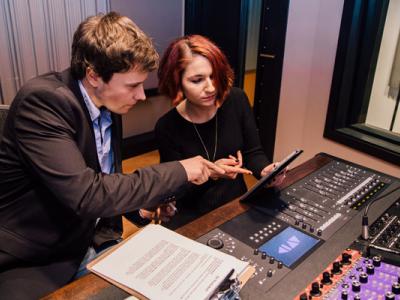What does a Music Director/Curator (Radio/Streaming Service) do?
Music directors (or MDs) work at mid-sized and smaller radio stations, where they are responsible for curating and maintaining the station's library of music. This means choosing songs to play based on the station's format, the interests and tastes of their listeners, and the MD's own good taste.
It also means going through the piles of new releases that arrive every day, assessing which ones will resonate with listeners, and then—during weekly meetings with the program director—suggesting which tracks should be added, what time of day they should be played, and how often they should repeat. Music directors also field song submissions from record label radio promoters and independent artists. Other duties include taking part in promotional events and activities on behalf of the station, devising music-related contests and giveaways, and monitoring audience research.
In the digital era, the job of tastemaker for mass audiences has moved over to streaming platforms like Spotify, Google Play, and Apple Music, where teams of behind-the-scenes curators create playlists from a music library that includes almost every song in the world. With one out of every five plays across all streaming services happening inside of a playlist, curated playlists are quickly becoming the dominant form of music discovery. Playlist curators, like their counterparts in radio, are constantly lobbied by artists, managers, and promoters hoping to get exposure for their songs.
At a Glance
This is a senior position in radio. Radio station music directors frequently get their start as radio DJs or interns working for local, independent, or college radio stations. After becoming music directors, they may continue to work as DJs or even take on the duties of a program director. Some music directors also start out working at commercial stations. However, large commercial radio stations are unlikely to have traditional music directors of their own, as this job is increasingly outsourced to research-driven automation.
Successful music directors build audience-pleasing playlists that result in high ratings and, in turn, strong advertising sales. Some of the best in the business are scouted by streaming services for playlist curation positions.
Aspiring radio music directors should do everything they can to get involved in radio: working at a college station, DJing a radio show, creating playlists for the station, and learning basic broadcasting practices. From there, one can go out for entry-level radio station positions, apply for internships, or volunteer for the local station's street team.
Jobs for playlist curators are rare, but the field is growing every day. In 2016, Spotify had a 50-person team—many of them former DJs and bloggers—that had created more than 4,500 playlists, 30 of which had over a million followers. Job openings are posted on the services' respective websites.
- Broadcasting
- Scheduling
- Hiring
- Music programming software
- Research and analytics
- Good ears for music
- Written and verbal communication
- Networking
- Negotiation
Good music directors are curious, open-minded, and passionate enough to spend hours each day combing through new releases to find a fantastic band or sound. MDs and curators should be voracious consumers of music, social media, and pop culture, ready to jump on viral tracks at the drop of a dime. It's also important to be forward-thinking—with the taste and vision to shape cultural trends—and bold when necessary; music directors who constantly play it safe with market-tested tracks are unlikely to stand out from the pack, and won't carve out much of a musical niche for their station.
Although radio station music directors technically work standard office hours, they usually spend a large amount of off-duty time scouring live shows and the web for new talent. Networking with music industry professionals at social events and concerts is also a big part of the job. Although playlist curators are generally asked to come into the office for a certain amount of time each week, aside from that, they enjoy very few restrictions on their work life. For playlist curators, working generally means listening: a task that they undertake anywhere, anytime, and usually—considering the massive amounts of music released every week—all the time.






